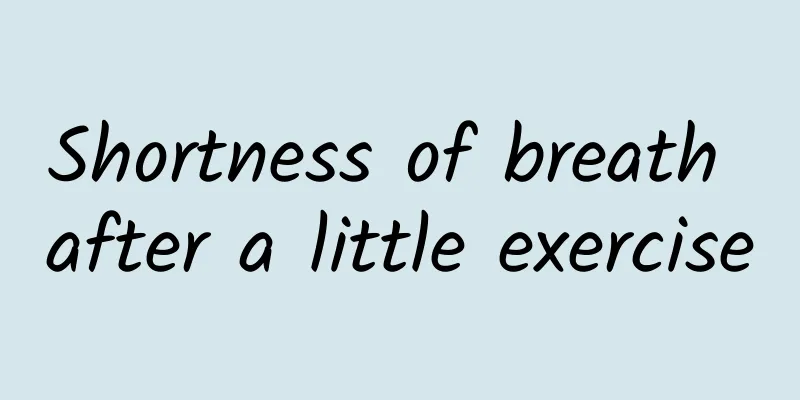Shortness of breath after a little exercise

|
With the continuous improvement of living standards, people have fewer and fewer opportunities to exercise. Except for going to the gym to exercise during their rest time, they rarely do more vigorous exercise. So now many people will experience shortness of breath when they do a little exercise. If similar situations occur frequently, you should pay attention, as it is likely that the shortness of breath is caused by exercise. Why do I get out of breath after exercising? Studies have shown that 80% of asthma patients will suffer from asthma attacks during exercise, and nearly 40% of patients with simple allergic rhinitis will experience asthma symptoms during exercise. Typical exercise asthma usually occurs within five to twenty minutes after exercise, and symptoms include coughing, wheezing, chest tightness, and even chest pain. Other symptoms, such as sudden shortness of breath, may occur five to ten minutes after exercise. The exact cause of this type of asthma has not been determined, but it is generally believed to be closely related to respiratory allergies and the respiratory tract's response to changes in ambient temperature and humidity. Why do I get out of breath after a little exercise? During normal breathing, after air enters through the nose, the mucous membrane of the nasal cavity will turn the dry and cold air into warm and humid air. The air then enters the alveoli through the bronchi for gas exchange. However, during strenuous exercise, because the ventilation volume increases rapidly, air enters the bronchi directly from the mouth. The dry and cold air directly stimulates the bronchial walls, causing the bronchi to spasm and lead to asthma attacks. In addition, if there are too many air pollutants, pollen, secondhand dust, or athletes have respiratory infections in the sports environment, it may trigger the onset of exercise-induced asthma. How to determine if you are out of breath during exercise The diagnosis of exertional asthma is primarily established by medical history and post-exercise lung function testing. Doctors can use a respirometer to test an athlete's lung function before exercise, at different times during exercise, and after exercise. If the forced expiratory volume in the first second is reduced by more than 12 to 15% compared to the pre-exercise value, it means that the athlete is likely to suffer from exercise-induced asthma. Suffering from exercise asthma does not mean that you lose the right to exercise. Careful selection of exercise methods can help avoid recurring attacks. Swimming is generally considered the most suitable sport because the swimming environment is warm and humid, the muscles of the whole body are exercised regularly, and the horizontal posture can help the movement of mucus in the lungs. In addition, hiking and cycling are also good choices. As for some intense sports, such as basketball, football, sprinting, and baseball, they are less recommended for such patients because they require explosive power and cannot effectively control breathing. How to prevent exercise-induced asthma First of all, using an inhaled short-acting beta-sympathetic stimulant fifteen minutes before exercise can effectively control and prevent the onset of exercise asthma. Up to 90% of patients can be well controlled in this way, and the preventive effect can last for four to six hours. Even if an asthma attack occurs, these drugs can effectively reduce the severity of symptoms. In addition to medication, warm-up before exercise and cool-down after exercise are even more important. As mentioned earlier, exercise asthma is most often caused by dry and cold air directly irritating the tracheal wall. Jogging before and after exercise can slowly increase and decrease the air temperature in the lungs with the intensity of exercise, thereby preventing asthma attacks due to rapid temperature changes. |
<<: Can benign bone tumors be cured?
>>: How to relieve breast engorgement and pain
Recommend
9-year-old child's lips are pale and bloodless
In our daily life, the normal lip color is pink, ...
The efficacy and function of pig dung grass
Croton dung grass is also called white pig dung b...
How do ankle cysts form?
Many people don’t know what ankle cysts are. It i...
The role of bear bile
Bear bile is not very common. It is very helpful ...
Early symptoms of glaucoma
Glaucoma is a very common eye problem. There are ...
Traditional Chinese Medicine Treatment Methods for Pulmonary Tuberculosis
With the continuous improvement of living standar...
What should I do if I have a lot of acne on my face?
Acne is usually caused by clogged pores, and may ...
What are the possible reasons for a child to faint suddenly?
Syncope is not an independent disease, but a symp...
Can I drink milk if I have chronic gastritis?
The stomach is a relatively important part of our...
What is McBurney's point of the appendix?
McBurney's point of the appendix is a speci...
Is folliculitis contagious?
Hair is a common sign on our skin. Folliculitis i...
Causes of purple toenails
A big reason for purple toenails is blood accumul...
What should people with hot constitution eat?
Human physique is divided into cold and hot. Peop...
Can I drink water before a colonoscopy?
Gastrointestinal diseases. Everyone knows that al...
What to eat to nourish the uterus after miscarriage
Nowadays people's minds are very open and pre...









